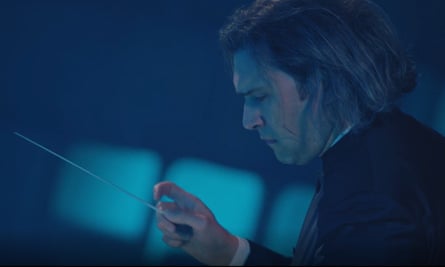Auditorium stylishly redesigned under its peaked canopy, sides open to the elements to allow for ventilation, fixed seats replaced by recycled, movable chairs: all these are the steps the ever imaginative Opera Holland Park, in its silver jubilee season, has taken to bring safe performances back to its audience, and they worked. Capacity is only 40% – 400 people, with economic consequences to bear – but the first night buzzed with a sense of welcome return and strange-new-world adventure.
This is still a youthful company by opera standards, but for the past decade OHP has nurtured young artists, with a perceptive eye for talent. The fruits were on offer in a new staging of The Marriage of Figaro (sung in Italian) in which three of these homegrown singers took principal roles, triumphantly: Elizabeth Karani (Susanna), Nardus Williams (Countess Almaviva) and Julien Van Mellaerts (Count Almaviva), with Ross Ramgobin as Figaro and Samantha Price as Cherubino, both returning to OHP.
Oliver Platt’s production, designed by Takis, took its visual accents from Mozart’s time – powdered wigs, frock coats – but with clever splashes of the contemporary. The broad daylight start of “outdoor” opera can be a challenge and this took time to find focus, voices at first not quite matching the zippy buoyancy of the City of London Sinfonia, conducted by George Jackson. When it did ignite – singers growing in confidence, racing around the double stage, enjoying the detailed wit of Platt’s direction – it blazed, helped by the supporting cast and heroic, eight-strong chorus. By the time Van Mallaerts’s slippery, urbane Count begged forgiveness from his gracious, emotionally battered Countess (Williams making a rich, silken-voiced role debut), we knew what we’d missed all year.

Were we ever able to go to Munich – the day may come – we would soon find musical life steered by two figures now central to UK cultural life. Simon Rattle will be chief conductor of the Bavarian Radio Symphony Orchestra. Vladimir Jurowski, after 14 exceptional years with the London Philharmonic Orchestra – the longest serving principal conductor of any London orchestra – is to become music director of the elite Bavarian State Opera. Serious, uncompromising, daring, this Russian has been an exciting asset, and we’ll miss him. His farewell concert at the orchestra’s Royal Festival Hall home was, out of necessity, filmed and livestreamed (available on Marquee TV). The upside is that it leaves us with an invigorating testament of what this partnership has achieved.
Tchaikovsky’s Swan Lake has been close to Jurowski’s heart since his Moscow childhood. He has long wanted to perform the work with the LPO in the original 1877 version – two and a half hours of music, with all 54 numbers, as the composer wrote it. Most of us only hear Swan Lake in the rejigged 1895 version by Marius Petipa and Lev Ivanov, shaped for their own choreography two years after Tchaikovsky’s death. The original is a darker, more exploratory work, the orchestration symphonic in logic and invention. Here, each finale of the four acts felt more disturbing and electrifying than the last. The LPO played at the top of their game, with each soloist deserving mention, especially the leader, Pieter Schoeman, who was virtuosic in his miniature violin concerto passages. Jurowski will be with the LPO at the Proms on 12 August and back again in the autumn. Book now.
In their new partnership with St John’s Smith Square, the Southbank Sinfonia gave a “rush hour” concert of unfamiliar British repertoire related to landscape. Vaughan Williams’s early Serenade in A minor, full of swelling themes and folk-inspired charm, might not supplant his more mature works but was a pleasure to hear. Thea Musgrave’s Green (2014) for strings bristles with lively conflict around the opposing forces of violin and bass, deftly played. Michael Nyman’s 1998 work Strong on Oaks, Strong on the Causes of Oaks lacks that same taut energy but bounces along amiably. (Replace “oaks” with “crime” for the wry New Labour presence here.) Olivia Clarke, Mackerras fellow at English National Opera, conducted with sharp, analytical insight and lyrical purpose: a name to watch.
Star ratings (out of five)
The Marriage of Figaro ★★★★
LPO/Jurowski ★★★★
Southbank Sinfonia/Clarke ★★★★
The Marriage of Figaro is at Opera Holland Park, London, until 28 June

Comments (…)
Sign in or create your Guardian account to join the discussion